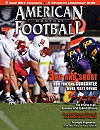AMERICAN FOOTBALL MONTHLY THE #1 RESOURCE FOR FOOTBALL COACHES
|
|
Article Categories
|
From the Coach�s Bookshelf � Winning Footballby: Bill Ramseyer© More from this issueIn his new book Winning Football, Bill Ramseyer provides a blueprint for coaching success. Based on lessons he�s learned from his decades in coaching, the book is a complete handbook that examines all parts of the game. Here is an excerpt from his opening chapter. Elements of Success
Success can be measured in many ways. If you are a coach, perhaps you measure success by the positive influence you have on the lives of the players you coach � the attitudes they build on and off the field, the percentage of players who graduate, the careers they enter, the relationships they develop. If you are a player, you might measure success by how hard you have worked to earn your achievements or by how much you are valued by your teammates. Many people measure coaching and playing success by the number of games or ....The full article can only be seen by subscribers.
Subscribe today!

|
|
|
NOT A SUBSCRIBER?
Subscribe
now to start receiving our monthly magazine PLUS get INSTANT
unlimited access to over 4000 pages of 100 percent football coaching
information, ONLY available at AmericanFootballMonthly.com!
|
|
|
HOME
|
MAGAZINE
|
SUBSCRIBE
|
ONLINE COLUMNISTS
|
COACHING VIDEOS
|
Copyright 2025, AmericanFootballMonthly.com
All Rights Reserved






